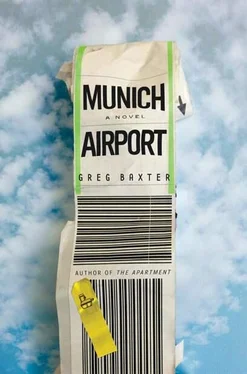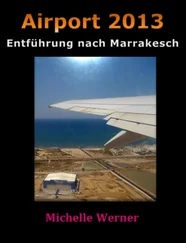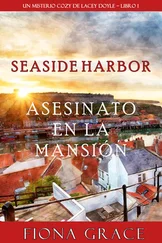When he got out of the pool, dried himself off, and went to bed, Miriam and I went for a drive to my mother’s family’s camp, a big cabin about an hour north of the house, on a river that everybody calls a lake, because it is so wide. We took my father’s truck and arrived around midnight. We went inside and got a bottle of something from the drinks cabinet and went out to the boat that was floating in the dock and drank so much that neither of us could drive back, so we stayed out all night. I felt jetlagged and very drunk. The night was full of mosquitoes, the air smelled of rotten fish and creosote, and I thought it was a shame my sister wasn’t beautiful. I wanted a beautiful sister. The water was a little choppy, even behind the break. And the boat made thumping sounds as it rocked from side to side. I was wearing a black suit and Miriam was in a long-sleeve black dress. The seats on the boat made our clothes dusty. I put my arm around Miriam, in an attempt to be brotherly, but I stood up ten seconds later and went inside the house for something else to drink, and to go to the bathroom. I stumbled up the jetty. I went inside and found some warm beers and opened a drawer to get a bottle opener and saw a bunch of half-rusted knives. I brought one knife outside with me, a knife for gutting fish. Miriam was half-asleep when I returned, but the sight of the knife woke her up. I could see she was frightened. I sat down across from her and held the knife to my own throat. I kept it there a long time, and pressed it hard into my skin, just under my jaw at the ear. She waited. I don’t remember if, at any time while I held the knife there, I truly examined the possibility of cutting my own throat, but I said something like, I am this close to knowing what awaits us, I am so close to actual proof, can you imagine it? She stopped being frightened and said that if the world were ending in an hour, if everybody knew the end was coming, there wouldn’t be a context to place my sincerity. For a moment, I thought it would be interesting to see what she would say about sincerity if I held the knife to her throat, but I threw it in the water instead, drank from my beer, lay back, and said, Yes, it would be strange, all right. Miriam climbed beside me on the cushion and said that she would give me a tearful good-bye anyway, even if the end was coming. We slept. I awoke to something strange and wonderful — I can still hardly believe it. We were moving. We were moving across the lake, the engine was whizzing and the boat was rising and falling. I couldn’t understand how I hadn’t woken up sooner. There was a bright orange morning light all over the sky, and a solid, warm, humid breeze. I was lying on my back at the front of the boat, looking aft, and Miriam, now only in her underwear, was driving the boat, sitting at the wheel and motoring upstream. There was a great stench of water. The sun was just above the horizon, above the trees that lined the shore in every direction. It was already hot. It was already semi-unbearable. I took my suit off, then my shirt and socks, then my watch. I undressed down to my boxer shorts. Then it felt fine. Miriam stopped the boat and dropped the anchor, and we swam for a little while in the brown and opaque water, water that could have been seven or fifty feet deep. When we climbed back in and sat down to dry ourselves in the sunlight, Miriam said, I dislike everything about this place. I dislike the heat. I dislike the smell. I dislike the food. I dislike the mosquitoes. I dislike the people. I dislike the way people talk. I dislike the way I talk. I dislike what people think. I dislike what they buy. I dislike the way they drive. I dislike what they believe. A few minutes later, I said, Do you think I’d like Berlin? She was lying down with her eyes closed, yawning a lot. I poked her. She said, Don’t you like London? I do, I said, but I only want to stay there for a few more years, I don’t want to be in London all my life, plus if I lived in Berlin, and you moved there, we’d be in the same city. She yawned and said, That might be nice, yes. Then she dozed off. I got behind the wheel and drove back to the camp. Miriam lay still the whole way, with her eyes closed. I do not know if I stared at her that morning, but now, in my memory, I stare at her. She was slender and a little bit muscular, with a muscular stomach. She was pale. She had small breasts and a slightly protruding breastbone. She had long fingers, bony elbows, and arched feet. She needed to gain weight. Her sleeping body trembled on the cushion while the boat surfed the choppy water, and convulsed when we hit a big wave — the river was starting to fill with other boats, water-skiers, jet skis, pontoon boats, and so on. And in the airport, now, I look up and down the columns of cities, trying to figure out a pattern for the cancellations, and the unintended side effect of this is that I keep imagining myself asking Miriam if I’d like these cities, too. Do you think I’d like Warsaw? Do you think I’d like Bucharest? Do you think I’d like Oslo? Do you think I’d like Prague? Do you think I’d like Abu Dhabi? Do you think I’d like Kiev? Do you think I’d like Paris? Do you think I’d like Barcelona? Do you think I’d like Rome? Do you think I’d like Cairo? Do you think I’d like Athens? Do you think I’d like Lilongwe? Do you think I’d like Moscow? Do you think I’d like Riga? Do you think I’d like Istanbul? Do you think I’d like Dar es Salaam? Do you think I’d like Amsterdam? And the territory of my disappointment grows, like the outer boundaries of an empire on a map.
I docked the boat, we put away our empty bottles, and we drove my father’s truck slowly back home, in heat that was abominable, and which I sometimes think I can actually feel in my memory. When we got home, Miriam slept a little more, then spent the afternoon and evening putting all her keepsakes from childhood in boxes and carrying her boxes to the street. My father and I observed this and said nothing. She left the next day. She went to visit a friend in Arizona. I think she lived in Arizona for six months. I don’t know where she went after Arizona. Maybe straight to Berlin. Maybe somewhere else first. It would be several years before I saw her again. We let the garbagemen load her stuff into a truck and haul it away. Right up until the moment they did so, I believed that I, or my father and I, would run out to the street and rescue everything. But as soon as they left with the boxes, I immediately started packing my own things in boxes, and eventually I took them out to the street. I stayed there for two more weeks. My father left after three or four days, back to California to catch up on a year’s worth of falling behind, or simply to be busy with small, achievable tasks. The grieving I’d planned for never took place. And I was in the house on my own. None of my friends from childhood remained, except those I didn’t want to see ever again. The people I might have liked to meet had moved to New York, Chicago, Los Angeles, for work. So I went to bars on my own, said nothing to anybody, had a single drink and departed. I jogged. I drove around, aimlessly. I watched a lot of television. Most of those people who left for bigger cities eventually started coming back to raise children, and on subsequent trips home I ran into them and caught up. They had changed. They had become people I didn’t have anything to say to. They often asked about Miriam, and though I never said it, I often felt like telling them that Miriam was the only one who had the courage not to come back, not to wonder what life would have been like if she’d stayed. Some of these people have children in high school now, children who drive cars. They returned from New York, from Chicago and Los Angeles, for quality of life, for values — Southern values, values of the suburbs and small towns — big lawns, big houses, interstates, a slower pace, parking lots, large dogs, family, mellifluous accents, polite neighbors, a refuge from variety and risk, and a shared contempt for impiety, for which the great cities were citadels.
Читать дальше











